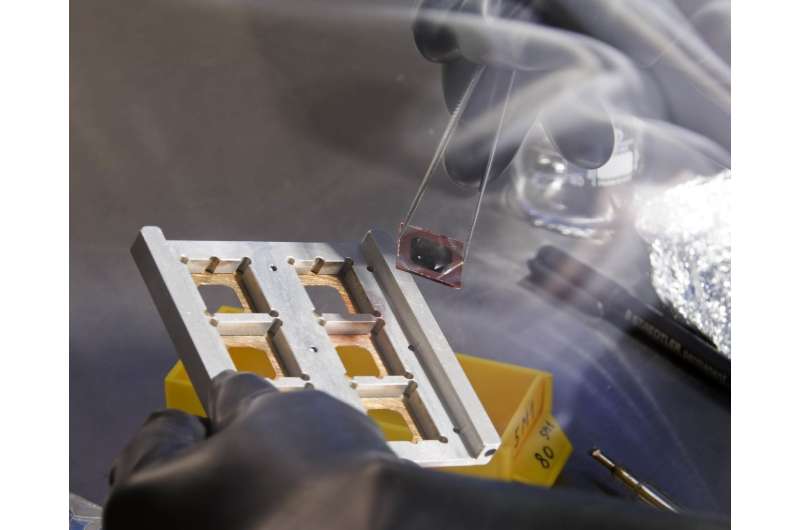Producing an OLED in a laboratory at the University of Bayreuth. Credit: Norbert Achtelik, Bayreuth.
Another major success for the University of Bayreuth: over the next four years, the university will be coordinating an intercontinental research network that has 3.9 million euros in funding. Taking an interdisciplinary approach, this network will enable international doctoral students to study and carry out interdisciplinary research in the field of organic light-emitting diodes (OLEDs). It seeks to boost the efficiency and durability of the diodes, which are crucial for television and smartphone screens, and to foster innovations such as curved or foldable displays.
This EU project is known as a Marie Słodowska-Curie Innovative Training Network (ITN). The core of the network consists of universities and research institutes as well as companies in Europe (companies account for one third of the network). Together, the project partners are seeking to expand and optimize the technological potential of organic light-emitting diodes. For this purpose, 15 positions are being advertised for doctoral researchers. Research work will range from basic and applied research to innovative developments. OLEDs are made from carbon-containing semiconductors which, as components of displays, can emit light with high colour contrast and ensure that the screens have very wide viewing angles.
"Our project has a strong international and interdisciplinary profile," said Professor Anna Köhler, an expert in the optoelectronics of soft matter at the University of Bayreuth and coordinator of the new EU research network. "We are particularly pleased that, in addition to our European partners, renowned universities and research institutions in the USA, Japan, Korea, and India are also participating in our network. They will offer our doctoral students research opportunities and frequent scientific contact. This ensures that the latest findings in the field of OLEDs are incorporated into the work of our early-career scholars. Worldwide technology transfer and exchange of experience are trademarks of the new ITN," Prof. Köhler explained.
International exchange is complemented by a structured training programme. This includes interdisciplinary workshops on specific research aspects and the targeted development of soft skills, and it also aims to foster personal development in general. In addition, doctoral students will have the opportunity to actively work at companies in the electronics industry during their doctoral studies, enabling them to set the course for their future careers at an early stage. "We intend to provide our young scientists with a great deal of international and interdisciplinary experience. Graduates of our EU network will thus have excellent opportunities on the globalized job market," said Peter Strohriegl, Professor of Macromolecular Chemistry at the University of Bayreuth, who has been advancing research on organic light-emitting diodes here for many decades.
The light emission from light-emitting diodes investigated in the new EU project is based on a process known as "thermally activated delayed fluorescence" (TADF). This research approach utilizes heat to convert excited states that do not emit light into emitting excited states, thereby increasing the luminance and efficiency of OLEDs – and thus the quality of future displays. However, before such highly efficient OLEDs can find their way into industrial products, their lifetime must also be improved. The research work within the network coordinated in Bayreuth is also expected to make a sustainable contribution in this area. Therefore, this new network is named "TADFlife."
Provided by University of Bayreuth























